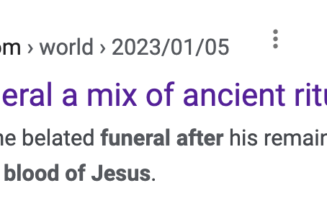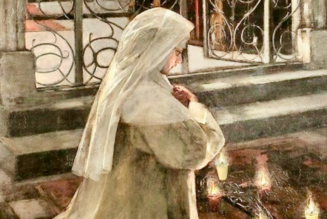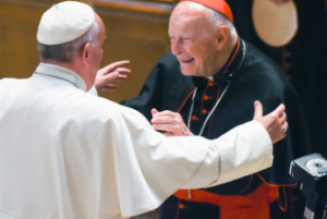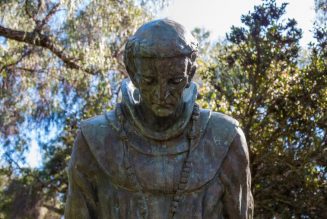Happy Friday friends,
And a very happy feast of St. Vincent de Paul to you all.
One of the great cost savings working at places like The Pillar is that there is no office to go to — I’m in D.C. (sort of), JD and Michelle are in Denver, Luke and Edgar are over the other side of the Atlantic, so where, exactly, would we rent an office, even if we had the cash?
Working from home is one of the great liberations: from the morning commute, from paying for parking, from the need to wear shoes.
I could, of course, tell you the trade-off is that if you never really go to the office, you can never really leave it, either. But the truth is I had a disordered approach to business hours long before I became self-employed.
By far the best thing about working from home, as a still relatively new father, is that, unless I am on the road, I never miss a family dinner. My phone might be blowing up at the table, and there might be the occasional argument about my need/desire to answer it, but I am at least there.
When I was in my 20s, I used to head to the office at about 7 a.m., and leave it at 6 p.m., more or less. This wasn’t weird or aberrant, it was fairly normal among the people I knew at the age when I was mostly expecting to become a parent for the first time.
I have no idea if God delayed giving us a child until we were nearly 40 because of the hours I used to keep, or if that’s just a providential fringe benefit. But looking back, it would have been a radically different experience for our family.
I am spoilt by the experience of hearing my daughter charge and crash around the house throughout the working day, bursting into my office to climb into my lap and demand a story or grab me by the finger to drag me to see the latest farmyard set up on her bedroom floor.
This is, I know, far from the normal daily sacrifice of so many parents who have to part company in the morning and fight to make it back before bedtime. I try daily not to take it for granted, even and especially when I am back at my desk at 10 p.m., or fielding phone calls in the dead of night.
Luxury comes in many kinds, and mine is the great extravagance of getting to be here, every day. I’m grateful for that — to God, and to you guys, our subscribers.
Here’s the news.
The News
The bishops of Germany issued yesterday new criteria for dismissing Church employees if they support “extremist” political parties, like the ascendant Alternative for Germany (AfD).
“The dissemination of right-wing extremist slogans — including racism and anti-Semitism in particular — is incompatible with professional or voluntary service in the Church,” the bishops have stated already this year.
Although the guidelines for dismissal are not binding on individual dioceses, they do seem to enjoy overwhelming support among the episcopate there, so expect them to see some use.
And bear in mind that the Church is one of the largest employers in the country — the local Caritas has more than 700,000 people working there.
—
The Sovereign Military Order of Malta’s international relief wing is opening a field hospital — an actual, not metaphorical field hospital — in the Gaza Strip.
Dr. Thomas Weiss, the Middle East director of Malteser International, announced the plans in a conversation with The Pillar this week, and discussed the logistical and diplomatic problems the knights face in trying to bring aid into the middle of a war zone.
He also talked about the Order of Malta’s commitment to political neutrality and to its Catholic identity, and how that all plays out in a region where religion and politics can seem pretty inseparable most of the time.
Read the whole conversation here.
—
When the synod on synodality meets next month in Rome for its final (for the moment) session, it will have substantially the same body of delegates as last year’s meeting.
Notably, though, while the 358 synodal members will contain only 25 new faces, they will include a near total turnover in the delegation from the Polish bishops.
So, who’s going and why the switch?
Catch them now while you can, and sign up to become a paying subscriber to keep reading them — along with Luke’s peerless morning news round-up Starting Seven.
—
On Sept. 22, 180,000 bikers converged on the Marian shrine at Fatima for a mass blessing of helmets. It is an annual event that, at least from the outside, looks like part pilgrimage and part motorcycle rally.
If that sounds like a weird mixture and a very interesting day out to you, it did to Filipe d’Avillez, too, and he was there to cover the whole thing for us.
Justice delayed
Pillar reader Cardinal Angelo Becciu was back in the news this week, offering a long and, I think it’s fair to say, fawningly deferential interview to the Italian publication Il Tempo.
One of the great mysteries to me at the center of the crowded Venn diagram of shady people and outrageous shenanigans we have come to call the Vatican financial scandal is how Becciu has managed to court and retain a devoted following in some sections of the Italian press.
In the interview, Becciu takes particular aim at the allegations, considered proven by the Vatican City court, that he funneled Church funds to his brother in Sardinia. For those who may need a primer on that story, you can read one here.
Suffice to say, the cardinal’s protestations to the contrary, there’s a compelling amount of evidence to be reckoned with.
Becciu also repeated his claims of having been an unwitting and peripheral figure in the London property scandal (again, for those looking to catch up see here).
Becciu’s key contention is that there’s no evidence he attempted to enrich himself via the complicated and ultimately calamitous deal, and on that, I agree with him. The cardinal, though, seems to maintain that this is proof in itself of his innocence and there we part company.
As has been proven true since time immemorial of political scandals — and really this is a political scandal as much as a financial one for the Vatican — it’s often the cover-up that is the real crime. And on this score, Becciu’s efforts to block oversight and accountability of his department’s finances, and keep what he was up to off-books and offshore, are where the problems begin and end for a lot of close observers.
Had the cardinal made a clean breast of the Secretariat’s disastrous entanglements when Cardinal Pell and curial auditors came knocking in 2016, instead of launching a full-blown Vatican turf war against them, he might be living in a very different world right now.
But one complaint made by Becciu does ring true for me. Following his conviction in December (along with several other alleged co-conspirators), the cardinal and his five-year prison sentence have been in something of a legal limbo. They have filed notice of their intention to appeal, but more than nine months later the judges have yet to release their full judicial rationale for the verdict.
“Now I await the appeal, with the paradox that everything was done very quickly in the final phase in the Tribunal, but for nine months we have been waiting for the reasons,” Becciu said. And I agree it is a paradox.
We know Becciu has been found guilty, and we know what evidence was presented in court against him. But we don’t know what, specifically, the judges decided the prosecution had proven. Until that full decision is published, the defense lawyers cannot begin their appeal, since they don’t know what it is they are appealing, exactly.
The longer this goes on, the more it lends credibility to the claims that the court rushed to judgment to bring the case to a close, ending the monthly media circus around its hearings.
Of course, there is no official word about the reasons for the hold-up, though there are plenty of competing theories.
I’ve heard some claim the whole thing has been kicked into the long grass so as not to let it disrupt the Jubilee year celebrations, though I think this would require a level of common purpose and coordinated intention and action across the civil and spiritual departments of the Vatican which I have never observed before, and would struggle to believe could be kept quiet.
Others I know have suggested the judges are struggling to backfill a verdict that was basically dictated to them from above (the pope) and which they now have to make seem credible on the evidence.
I struggle to allow myself to believe that the tribunal’s chief judge, Giuseppe Pignatone, would risk his professional credibility — and he amassed a considerable amount of it as an anti-mafia prosecutor in Italy — in this way. Though personal experience of the Vatican’s canonical process requires I admit that such pressure has been applied in other cases and could be again.
If it was in this case, it would truly be a crime against Becciu and the other defendants, but also against justice — especially given the strength of the evidence on many of the charges.
Another possibility is that ongoing legal cases in Vatican City and elsewhere relate immediately and materially to events at the center of the trial. It could be the judges are leery of releasing a judicial rationale that could prove determinative, not to say detrimental, to the Secretariat of State’s institutional interests in other trials.
Whatever the reason — and we must allow, I suppose, for sheer inefficiency to be considered as well — every week and month the release of the full decision is stalled and the appeal process paused represents an increasingly indefensible delay.
Past a certain point, justice delayed is justice denied — for the guilty as much as the victims.
Guess who’s not coming to dinner
Kamala Harris has apparently declined the customary invitation to attend this year’s Al Smith dinner, traditionally addressed by both presidential candidates in an election year.
She’s the first candidate to decline since Walter Mondale in 1984 and, as Cardinal Timothy Dolan wryly observed, things didn’t shake out well for him.
Harris’ decision to skip the dinner has been widely received as a snub, a pointed expression of her personal antipathy to the Church. And she certainly has form when it comes to signs of anti-Catholic bigotry.
As a senator, she famously grilled judicial nominees on their membership of the dangerous, extreme, “all-male society” the Knights of Columbus. And if anyone needs a reminder of what she thinks about the Church’s position on abortion, they could do worse than watch her frontal assault on Joe Biden on the issue during the 2020 Democratic primary debates.
But while I think it’s fair to assume Harris has no particular respect for the Church, I’m not sold that her Al Smith RSVP is the calculated Catholic slight many have taken it to be. In fact, I think that is a rather self-flattering take for Catholics to have.
In truth, I suspect Harris barely weighed the dinner’s significance in the Catholic cultural consciousness, if it registered with her at all. Instead, I think she was saying “no” to something else, really: the existence and value of cultural spaces and institutions apart from and outside of the political process.
I’m not going to pretend that candidates roasting themselves and each other in white tie with the cardinal sitting between them ever appealed to me particularly, either as spectacle or entertainment. But the significance of its place in the campaign calendar was real.
It was a reminder that the election cycle was a bubble that needed to be stepped out of from time to time, that the real world was above and beyond our politics.
The Al Smith dinner was common cultural ground, blessed (metaphorically) by the Church, where everyone could be reminded of the increasingly frayed truism that we have more in common than separating us.
But our non-political institutions have taken a battering no less than our political ones over the last decade, and the drift of our politics has been to weaponize what were once matters of personal conscience or even (perish the thought) outside the scope of government altogether.
When the very beginnings and ends of life are up for grabs, and the nature and definition of concepts like marriage, men, and women are part of the partisan debate, any institution with a view (let alone a doctrine) on the matter is treated as a greater or lesser moon in the political orbit.
Presidential politics is no longer a bubble to be stepped outside of, it’s the major league of the only game in town. Wider cultural institutions and their leaders are expected to pay court to political parties and candidates, and show up to perform like supporting acts at their rallies and conventions, not the other way round.
This being the case, small wonder if Harris doesn’t see the Al Smith invite as a chance to sit at a loftier cultural table for a night, but just a restricted-rules campaign appearance with her opposing candidate — a man who has certainly treated the dinner as such himself in the past.
As for the dinner itself, I wonder if the future of the event shouldn’t try to make a virtue of circumstance. Al Smith’s place in American political history and Catholic culture is real and should be celebrated.
But the man who scoffed at those who questioned a Catholic’s fitness to lead a secular nation would recognize little of what our politics has become.
“In the wildest dreams of your imagination, you cannot conjure up a possible conflict between religious principle and political duty in the United States, except on the unthinkable hypothesis that some law were to be passed which violated the common morality of all God-fearing men,” Smith wrote once in the Atlantic magazine.
Today, it’s the concept of a national “common morality” which has become the almost unthinkable hypothesis.
Perhaps in future election years, the New York archdiocese could honor those politicians, like Smith himself, who have contested in the political arena but come up short — as he did — by calling our country to a more noble vision of itself.
I’d sit down to dinner for that.
See you next week,
Ed. Condon
Editor
The Pillar
Comments 29
Services Marketplace – Listings, Bookings & Reviews










